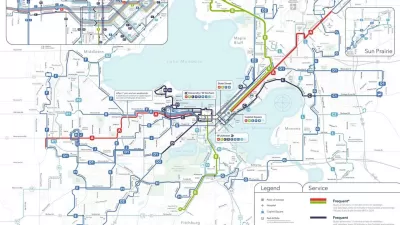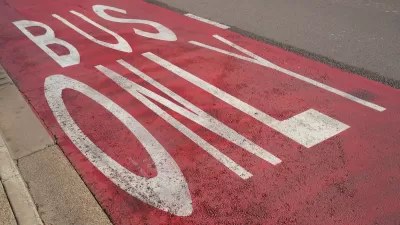Some portions of the bus rapid transit (BRT) system planned for Madison, Wisconsin will resemble the fully realized BRT systems more common in other parts of the world.

"Madison’s proposed $160 million Bus Rapid Transit system may run its special buses on dedicated center lanes with boarding stations on medians on some of the city’s main thoroughfares," reports Dean Mosiman from Wisconsin.
The center lane would only be built on some portions of the BRT route, according to Mosiman, wile other stretches would run on side lanes while mixing with car traffic. The dedicated center lanes, proposed for "Blair and Milwaukee streets and other stretches of East Washington Avenue on the East Side and on Whitney Way and Mineral Point Road on the West Side," would deliver more consistent service while also preserving bike lanes and street parking on those stretches, according to the article.
Back in March, the Madison City Council and the Greater Madison Area Metropolitan Planning Organization approved a preferred alternative route for the line, which will include 27 stations served by five- to 15-minute headways running from 5 am to midnight on weekdays, and 15- to 30-minute headways from 7 am to 11 pm on weekends.
"About 83,000 residents would live within a half-mile of stations, while about 110,000 jobs would be within that distance," according to Mosiman.
Madison Metro Transit planners are making refinements to the plan while waiting for approval for $107 million in federal money toward the total $160 million needed for the project.
FULL STORY: Madison may push Bus Rapid Transit system to center lanes

Planetizen Federal Action Tracker
A weekly monitor of how Trump’s orders and actions are impacting planners and planning in America.

San Francisco's School District Spent $105M To Build Affordable Housing for Teachers — And That's Just the Beginning
SFUSD joins a growing list of school districts using their land holdings to address housing affordability challenges faced by their own employees.

The Tiny, Adorable $7,000 Car Turning Japan Onto EVs
The single seat Mibot charges from a regular plug as quickly as an iPad, and is about half the price of an average EV.

Seattle's Plan for Adopting Driverless Cars
Equity, safety, accessibility and affordability are front of mind as the city prepares for robotaxis and other autonomous vehicles.

As Trump Phases Out FEMA, Is It Time to Flee the Floodplains?
With less federal funding available for disaster relief efforts, the need to relocate at-risk communities is more urgent than ever.

With Protected Lanes, 460% More People Commute by Bike
For those needing more ammo, more data proving what we already knew is here.
Urban Design for Planners 1: Software Tools
This six-course series explores essential urban design concepts using open source software and equips planners with the tools they need to participate fully in the urban design process.
Planning for Universal Design
Learn the tools for implementing Universal Design in planning regulations.
Smith Gee Studio
City of Charlotte
City of Camden Redevelopment Agency
City of Astoria
Transportation Research & Education Center (TREC) at Portland State University
US High Speed Rail Association
City of Camden Redevelopment Agency
Municipality of Princeton (NJ)





























